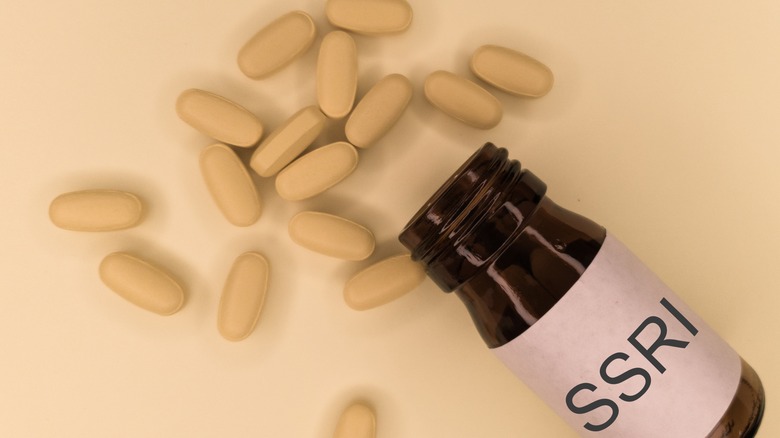Is It Safe To Take Antidepressants When Breastfeeding?
Most people who give birth will experience the baby blues a few days after the arrival of their little one, which is a condition characterized by an intense emotional state coupled with trouble concentrating and anxiety, per the March of Dimes. The baby blues are caused by sudden changes in hormones as the result of no longer carrying a pregnancy and can be exacerbated by the sleep deprivation that naturally comes with having a newborn to take care of. However, they should naturally clear up on their own within a couple of weeks.
In some cases, the baby blues don't settle out, and individuals may find themselves with continuing and intensifying feelings of sadness, anxiety, and hopelessness, among other symptoms. This is referred to as postpartum depression and affects around one in every seven people who have given birth, according to a 2022 article published in the journal StatPearls. It comes on within the first six weeks and can also bring anxiety or psychotic features, such as hallucinations. In general, however, most people with postpartum depression experience a lack of appetite, trouble sleeping, loss of interest in daily activities, and a persistent depressed mood.
The occurrence of postpartum depression will likely require the help of a professional, especially when accompanied by a desire to harm oneself or the baby, states the Mayo Clinic. Therefore, a professional can determine the best course of treatment for the affected individual, including the implementation of antidepressants.
Certain antidepressants are approved for breastfeeding individuals
Antidepressants are a common treatment method when it comes to alleviating the symptoms of postpartum depression. However, some may question whether they are safe to take when breastfeeding. The short answer is that most have been deemed not harmful to infants due to very low amounts of the drug making its way into maternal breastmilk, explains the MGH Center for Women's Mental Health. While different categories of antidepressants are commonly prescribed to treat the condition, selective serotonin reuptake inhibitors (SSRIs) have been found to be the safest, given the elevated number of studies targeting them specifically.
One such 2011 review published in the journal Current Women's Health Reviews analyzed antidepressant use during breastfeeding and found that while the drugs were always detected in breastmilk, most concentrations were too low to raise concern. Certain SSRIs were even found to leave behind negligible amounts of the drug when the infants' blood was tested following ingestion, including paroxetine, fluvoxamine, and sertraline. That being said, the younger a baby is (up to three or four months of age), the higher the concentration of antidepressants in their blood due to a reduced ability to metabolize drugs. Overall, the authors concluded that antidepressants should not be excluded as a treatment method for postpartum depression in breastfeeding individuals when clinically warranted, especially in the case of safer SSRI options.
Other ways to manage postpartum depression
If you would rather not take antidepressants to treat your postpartum depression or are simply looking for additional ways to manage the condition, there are alternative options. Psychotherapy, for example, is one of the other common treatment methods, which involves talking through the experience with a qualified professional and developing coping skills, as per the Cleveland Clinic. If one-to-one therapy isn't your thing, you can also seek out a group setting that is overseen by a psychotherapist, which allows you to listen to the experiences of others going through postpartum depression and potentially build a support network.
In addition, making certain lifestyle changes can help in the case of postpartum depression, states Healthline. For example, you can prioritize self-care, ensuring that you are exercising, eating well, and taking care of basic hygiene tasks on a daily basis. Keep in mind, this may require the help of a partner, family members, or friends to make sure the baby is taken care of during these moments. Another option includes herbal supplements and vitamins, which may alleviate symptoms associated with the condition but should always be discussed first with your doctor.
The experts at Medical News Today add that bonding with the baby can also provide benefits for those dealing with postpartum depression. In other words, engaging in skin-to-skin contact with the baby, giving them massages, and singing to them, have all been found to reduce symptoms of depression.



